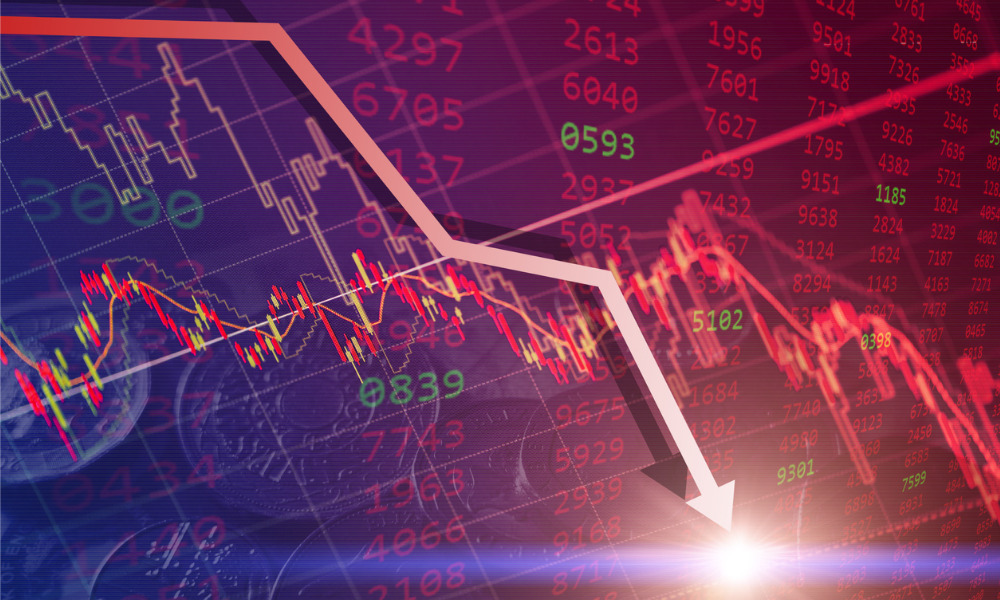

There seemed to be nowhere safe for investors in the stock market on Monday, with equities posting their sharpest single-day drop in more than a year as concerns over trade policies and economic uncertainty triggered widespread volatility.
The S&P 500 tumbled 2.7 percent and the Dow dropped 2.08 percent, while the Nasdaq 100 shed 4 percent, marking its worst day since 2020. The losses were led by the once-strong large-cap tech stocks, with Tesla sinking 14 percent and Nvidia contributing to a broader decline in semiconductor shares.
The selloff came as investors parsed a weekend statement from President Donald Trump on the potential economic impact of his trade policies. When asked during a Fox News interview whether he expected a recession, Trump declined to make a definitive prediction.
“I hate to predict things like that. There is a period of transition, because what we’re doing is very big,” Trump told Fox News on Sunday.
The latest downturn has placed the S&P 500 below its 200-day moving average for the first time since November 2023, a technical level closely watched by traders.
“There’s a saying on Wall Street about how nothing good happens below the 200-day moving average,” Callie Cox at Ritholtz Wealth Management told Bloomberg Monday. “Honestly, out of all the crazy sayings that come out of this industry, it’s one you should take seriously. Selloffs accelerate and swings get dramatically bigger in the danger zone – or the space below the 200-day moving average.”
Treasury yields fell amid expectations that a slowing economy could increase the urgency for the Federal Reserve to cut interest rates. The 10-year Treasury yield slid eight basis points to 4.22 percent, while the US dollar edged 0.3 percent higher. Meanwhile, West Texas Intermediate crude oil declined to just under $67 per barrel, extending its losses to more than 15 percent since mid-January.
The recent surge in volatility marks a shift in sentiment after years of economic resilience in the US, even as other global economies showed signs of weakening. The Cboe Volatility Index, or VIX, spiked to its highest level since August, reflecting heightened uncertainty among investors.
Wall Street strategists have grown increasingly cautious, with some re-evaluating their outlooks for 2025. Morgan Stanley’s Michael Wilson and analysts at JPMorgan Chase and RBC Capital Markets have noted that tariffs and broader trade uncertainty could weigh on economic growth.
“There are always multiple forces at work in the market, but right now, almost all of them are taking a back seat to tariffs,” Chris Larkin at E*Trade from Morgan Stanley told Bloomberg. “Until there’s more clarity on trade policy, traders and investors should anticipate continued volatility.”
Retail investors are also expressing growing concerns. A recent survey from the American Association of Individual Investors found that, for the first time since 2022, the majority of individual investors expect stock prices to decline over the next six months. Fewer than 20 percent anticipate gains during that period.
Despite this bearish sentiment, some analysts suggest that investors are still largely positioned for continued gains, leaving room for further market corrections if economic uncertainty persists.
“Here again we would reiterate that despite sentiment indicators like the AAII bull/bears numbers showing excessive bearishness from retail (newsletter writers), actual positioning of both Main Street and institutional investors remains skewed toward long equities,” said Dan Wantrobski at Janney Montgomery Scott. “This implies that there could be more firepower to unwind if our unstable macro landscape persists in the coming weeks/months.”
The sky-is-falling sentiment marks a sharp reversal from the initial animal-spirits bullishness Trump's November re-election sparked. Investor expectations were high after that win, with markets initially focusing on the potential benefits of tax cuts and deregulation for economic growth. However, with few specific policy details emerging on those fronts, trade tensions have instead taken precedence.
Over the past month, concerns over a potential global trade war have added to investor uncertainty as Trump escalated tariff measures against key US trading partners. The prospect of higher costs on a range of goods has raised fears that consumers and businesses – already navigating the effects of lingering inflation – could face additional financial strain.
As the dust settled on Monday afternoon, US stocks were on track for their weakest first 50 days of a presidential administration since 2009, according to MarketWatch. But unlike his first term, when the financial markets were among the go-to scorecards guiding his decision making, Trump seems dead set on looking past that.
“What I have to do is build a strong country,” he said on Sunday. “You can’t really watch the stock market.”

Two longtime RIA industry figures have joined the board of directors at TaxStatus, a fintech company that garners thousands of IRS data points on clients to share with advisors for improved financial planning oversight and time savings.

Sieg, 58, was head of Merrill Wealth Management, left in 2023 and returned that September to Citigroup, where he worked before being hired by Merrill Lynch in 2009.

Firms announce new recruits including wirehouse breakaways.

"QuantumRisk, by design, recognizes that these so-called "impossible" events actually happen, and it accounts for them in a way that advisors can see and plan for," Dr. Ron Piccinini told InvestmentNews.

Advisors who invest time and energy on vital projects for their practice could still be missing growth opportunities – unless they get serious about client-facing activities.
Orion's Tom Wilson on delivering coordinated, high-touch service in a world where returns alone no longer set you apart.
Barely a decade old, registered index-linked annuities have quickly surged in popularity, thanks to their unique blend of protection and growth potential—an appealing option for investors looking to chart a steadier course through today's choppy market waters, says Myles Lambert, Brighthouse Financial.
